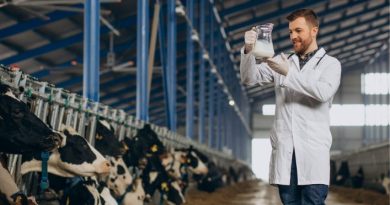Practices for Improved Dairy Yield in Nigerian Farms
Last Updated on August 15, 2023
Introduction
Dairy Yield Practices in Nigerian Farms play a pivotal role in Nigeria, holding significant importance by contributing to both the nation’s economy and its food security.
There is a pressing need for improved dairy yield in Nigerian farms due to increasing demand for dairy products.
This blog post aims to provide valuable insights and practices for Nigerian farmers to enhance their dairy yield.
Harnessing Dairy Farming’s Significance
Dairy farming bolsters Nigeria’s food security, economy, and livelihoods, playing a pivotal role in agricultural sustainability.
Bridging the Yield Gap in Nigerian Farms
- Demand Surge: Increasing population necessitates higher dairy production for consumption and industrial use.
- Economic Growth: Enhanced yields bolster income for farmers and contribute to rural development.
Understanding the Challenges
Current challenges faced by Nigerian dairy farmers
Lack of access to high-quality feed and forage
Nigerian dairy farmers often struggle to obtain high-quality feed and forage for their cattle. The limited availability of nutritious fodder greatly affects the overall productivity of dairy farms.
Inadequate breeding and genetics
The breeding and genetics of the dairy cattle in Nigeria are often subpar, resulting in lower milk yields. Many farmers do not have access to improved breeds or the knowledge to implement effective breeding programs.
Insufficient knowledge and training
There is a lack of proper training and knowledge among Nigerian dairy farmers, particularly regarding modern farming techniques and best practices. This hinders their ability to maximize milk production.
Emphasize the impact of these challenges on dairy yield
The challenges faced by Nigerian dairy farmers have a significant impact on the overall dairy yield in the country. Let’s take a closer look:
Lack of access to high-quality feed and forage
Without nutrient-rich feed and forage, cows are unable to meet their dietary requirements, resulting in lower milk production. Insufficient feed quality directly translates to reduced dairy yield.
Inadequate breeding and genetics
Poor breeding and genetics lead to cows with inferior milk-producing capabilities. When dairy farmers do not have access to improved breeds or knowledge about effective breeding practices, the result is lower milk yield.
Insufficient knowledge and training
If farmers are not properly trained on modern farming techniques and best practices, they may not know how to optimize their dairy production.
Lack of knowledge directly affects dairy yield as farmers may not implement the most efficient methods.
These challenges are interconnected and create a cycle of low dairy yield for Nigerian farmers.
Without high-quality feed and forage, cows do not reach their milk production potential.
Subpar breeding and genetics further reduce milk yields, while insufficient knowledge and training hinder farmers’ ability to improve their practices.
How to address these challenges
To address these challenges and improve dairy yields in Nigerian farms, proactive measures need to be taken.
Providing farmers with access to high-quality feed and forage is crucial.
This can be achieved through government initiatives and partnerships with agricultural organizations to ensure the availability and affordability of nutritious feed options.
Investing in breeding programs and promoting the use of improved genetics can also significantly boost milk yields.
Providing farmers with the necessary knowledge and training through agricultural extension services, workshops, and educational programs will further empower them to implement effective farming practices.
By addressing these challenges and actively implementing solutions, Nigerian dairy farmers can enhance their yields and contribute to the growth and sustainability of the dairy industry in the country.
Read: Understanding the Role of a Farm Manager in Nigerian Agribusiness
Best Feed and Nutrition Practices
Types of Feed and Forage Suitable for Dairy Cows in Nigeria
Dairy cows in Nigeria can be fed with a variety of feed and forage options.
These include grasses, legumes, silage, hay, corn, and protein-rich concentrates.
Different combinations of these feeds can provide a balanced diet for the cows.
Farmers should focus on locally available and affordable options to ensure sustainability.
Importance of Balanced Nutrition for Improved Milk Yield
Balanced nutrition plays a crucial role in achieving improved milk yield in dairy cows.
Cows need a combination of energy, protein, vitamins, minerals, and water to produce quality milk.
Insufficient or imbalanced nutrition can lead to lower milk production, poor cow health, and reproduction issues.
Feeding a well-balanced diet ensures optimal milk yield, profitability, and cow well-being.
Strategies for Optimizing Feed Utilization and Ration Formulation
To maximize feed utilization and optimize ration formulation, farmers should follow these strategies:
- Conduct regular forage and feed analysis to determine their nutrient content.
- Use professional nutritionists or extension services to formulate well-balanced rations.
- Consider the cow’s stage of lactation, body condition, and production goals when formulating rations.
- Efficiently manage grazing systems, rotational grazing, and paddock sizes to prevent overgrazing and ensure adequate forage availability.
- Implement a feeding plan that provides a consistent supply of high-quality feed and avoids sudden dietary changes.
Significance of Proper Storage and Handling of Feed
Proper storage and handling of feed are crucial for maintaining feed quality and minimizing wastage.
Feed should be stored in clean, dry, and well-ventilated areas to prevent mold growth and moisture contamination.
Using airtight containers or silos can protect feed from pests and reduce spoilage.
Avoid storing feed for extended periods and maintain a first-in, first-out policy to prevent feed deterioration.
Regularly inspect feed for signs of spoilage, mold, or infestation and promptly remove any affected batches.
By ensuring proper storage and handling practices, farmers can maximize the nutritional value of feed and minimize costs.
In essence, providing suitable feed and forage options, ensuring balanced nutrition, optimizing feed utilization, and practicing proper storage and handling techniques are essential for improving dairy yield in Nigerian farms.
Adopting these best practices will lead to healthier cows, increased milk production, and ultimately higher profitability for dairy farmers.
Read: Fostering the Participation of Women in Farm Management in Nigeria
Breeding and Genetics Improvement
Breeding and Genetics in Enhancing Dairy Yield
These practices involve selecting animals with desirable traits and genetic potential for increased milk production.
By carefully choosing superior animals for breeding, farmers can improve milk production in their herds.
This process helps to ensure that offspring inherit favorable genetic attributes, resulting in higher dairy yield.
Through proper breeding and genetics management, Nigerian farmers can achieve significant improvements in milk quality and quantity.
This is essential for meeting the increasing demand for dairy products in the country.
Breeds Suitable for Nigerian Conditions
In Nigeria, several breeds are suitable for dairy farming due to their adaptability to local conditions.
One of the most popular breeds is the Holstein-Friesian, known for its high milk production potential.
Another suitable breed is the Jersey, which is smaller in size but known for its high butterfat content in milk.
This breed is adapted to tropical climates and is well-suited for Nigerian farms.
The Sahiwal breed is also suitable for Nigerian conditions, as it is highly resistant to various diseases and can efficiently utilize low-quality feed.
This breed is known for its heat tolerance and high milk production.
Importance of Selecting Genetically Superior Animals
Selecting genetically superior animals is crucial for improving dairy yield.
These animals possess desirable traits such as high milk production, good health, and efficient feed conversion.
By choosing genetically superior animals for breeding, farmers can ensure that their herds have a higher likelihood of inheriting these advantageous traits.
This leads to improved milk production and overall herd performance.
Selecting genetically superior animals also helps in reducing the occurrence of genetic disorders within the herd.
This ensures the long-term sustainability and profitability of the dairy farming business.
Breeding Techniques and Artificial Insemination
To achieve improved dairy yield, farmers can employ various breeding techniques and artificial insemination.
These methods allow for controlled mating and the selection of desired genetic traits.
Artificial insemination is a widely used technique in dairy farming, especially in Nigeria.
It involves the introduction of genetically superior bull semen into the female reproductive tract using specialized equipment.
This technique allows farmers to access semen from top-performing bulls worldwide, ensuring the introduction of superior genetics into their herds.
It also reduces the risk of diseases associated with natural mating and improves genetic diversity.
Other breeding techniques include embryo transfer, where embryos from genetically superior cows are transferred to surrogate mothers.
This technique enables the replication of superior genetics and increases the number of offspring from valuable animals.
Essentially, breeding and genetics play a significant role in enhancing dairy yield in Nigerian farms.
By selecting suitable breeds, choosing genetically superior animals, and employing breeding techniques like artificial insemination, farmers can achieve improved milk production and ultimately, increase their profitability in the dairy industry.

Effective Herd Management
Regular Health Checks, Vaccinations, and Deworming
Regular health checks play a vital role in maintaining high dairy yield in Nigerian farms.
Proper health management ensures the well-being of the herd, minimizing the risk of diseases and infections.
Regular veterinary visits are essential to monitor the overall health of the animals.
Vaccinations form a crucial part of preventive healthcare. Immunizing the herd against common diseases and infections helps in reducing the probability of outbreaks.
Vaccines provide protection to the animals and can significantly improve their overall productivity.
Deworming is equally important to maintain the optimal health of the herd.
Internal parasites can have detrimental effects on the animals’ digestion and nutrient absorption capacity.
By implementing a deworming schedule, farmers can safeguard their animals from the negative consequences of infestations.
Proper Housing and Ventilation Systems
Proper housing and ventilation systems are critical for dairy farms in Nigeria.
Cows need a comfortable and clean living environment to maximize their milk production potential.
The following factors should be considered:
- Adequate space: Provide enough space for each cow to move freely. Overcrowding can lead to stress and a decline in milk production.
- Comfortable bedding: Use clean and soft bedding materials to maintain the comfort of the animals. It helps prevent injuries and stress, which can affect milk production.
- Efficient ventilation: Proper airflow is crucial to prevent the buildup of ammonia and other harmful gases, which can negatively impact cow health. Install adequate ventilation systems to ensure a fresh and clean environment for the herd.
- Effective drainage: Proper drainage systems prevent fecal contamination and minimize the risk of diseases. Regularly clean and maintain the barn to ensure hygienic conditions.
Importance of Hygiene and Cleanliness in the Barn
Maintaining good hygiene and cleanliness in the barn is essential for maximizing dairy yield in Nigerian farms. Here are some key practices:
- Regular cleaning: Clean the barn and milking areas daily to remove manure, bedding waste, and any other debris. Regular disinfection of surfaces eliminates pathogens and reduces the risk of infections.
- Proper waste management: Implement a proper waste disposal system to prevent the buildup of waste, which can attract pests and lead to disease transmission.
- Milking hygiene: Maintain high standards of cleanliness during milking, including proper udder cleaning, sterilization of milking equipment, and prompt refrigeration of milk. This reduces the risk of bacterial contamination and ensures the production of quality milk.
- Strict biosecurity measures: Implement biosecurity protocols to prevent the introduction and spread of diseases. Restrict farm access to authorized personnel only and enforce proper sanitization practices.
Tips for Effective Reproduction and Calf Management
Here are some tips to consider:
- Breeding programs: Implement efficient breeding programs to ensure optimal genetics for higher milk yield. Work closely with veterinarians to develop a suitable breeding plan for your herd.
- Proper nutrition: Ensure proper nutrition for pregnant cows to support calf development. Provide a balanced diet rich in essential nutrients, vitamins, and minerals.
- Calving management: Properly manage the calving process by providing clean and warm calving areas. Monitor cows during labor to intervene if necessary and provide immediate care and nourishment to the newborn calves.
- Colostrum management: Ensure calves receive colostrum within a few hours of birth. Colostrum provides essential antibodies for their immune system development.
- Weaning and socialization: Properly wean the calves and gradually transition them to solid food. Provide a comfortable and clean environment for their growth and socialization.
By implementing effective herd management practices, Nigerian dairy farmers can optimize milk yield, ensure animal welfare, and promote a healthy and prosperous dairy industry.
Read: Farm Manager Training and Education Programs in Nigeria
Adoption of Modern Technologies
Innovative Technologies for Dairy Farming in Nigeria
- In-vitro fertilization (IVF) can improve the quality of dairy cattle breeds.
- Artificial insemination (AI) is a cost-effective technique for breeding dairy cows.
- Automatic feeding systems provide accurate and consistent nutrition for dairy herd.
- Cooling systems help maintain optimal temperature conditions for cows in hot climates.
Benefits of Using Automated Milking Systems and Milking Parlors
- Automated milking systems increase milking efficiency, saving time and labor.
- Milking parlors allow for gentle and hygienic milk extraction, ensuring high-quality milk.
- Automated systems reduce the risk of mastitis and improve udder health in dairy cows.
- Electronic milk meters accurately measure milk yield, facilitating better record-keeping.
Importance of Data Collection and Analysis for Productivity Improvement
- Data on milk production, cow behavior, and health can identify areas for improvement.
- Data analysis helps identify cows with high milk production potential for selective breeding.
- Monitoring milk composition and quality ensures better product differentiation and marketability.
- Data-driven decision-making enhances overall efficiency and productivity on dairy farms.
Role of Technology in Improving Overall Farm Management
- Farm management software enables efficient tracking of inventory, finances, and farm operations.
- GPS technology optimizes land and crop management, improving resource utilization.
- Automated systems for feeding and milking minimize manual labor and operational costs.
- Cow monitoring systems provide real-time data on health, fertility, and behavior.
The optimization of Dairy Yield Practices in Nigerian Farms through modern technologies offers substantial enhancements in productivity and profitability.
Innovations like in-vitro fertilization (IVF) and artificial insemination (AI) hold the potential to elevate dairy cattle breeds significantly.
These methods, central to Dairy Yield Practices in Nigerian Farms, enable the selection of superior genetic traits, amplifying herd productivity and resilience.
The efficiency of the milking process is also transformed by automated milking systems and advanced milking parlors, aligning seamlessly with Dairy Yield Practices in Nigerian Farms.
Data-driven insights underpin progress in dairy farming.
Gathering and analyzing data on milk production, cow behavior, and health informs decision-making and continual improvement within Dairy Yield Practices in Nigerian Farms.
Monitoring milk quality adds market competitiveness.
Farm management software and GPS technology optimize operations and resource use in congruence with Dairy Yield Practices in Nigerian Farms.
Automation, observed in feeding and milking, reduces costs.
Real-time cow monitoring enhances health, fertility, and breeding programs within the scope of Dairy Yield Practices in Nigerian Farms.
Embracing these technologies is pivotal for Nigerian farmers, fostering global competitiveness and sustainable growth in the dairy industry aligned with Dairy Yield Practices in Nigerian Farms.
Access to Education and Training
Promote the importance of education in the dairy industry
Education plays a crucial role in improving dairy yield in Nigerian farms. It equips farmers with the necessary knowledge and skills to maximize their productivity and profitability.
By emphasizing the value of education, farmers will understand its direct impact on their business success.
It allows them to stay updated with the latest advancements, technologies, and best practices in the dairy industry.
Moreover, education enables farmers to adopt sustainable and efficient methods, enhancing milk production, herd management, and overall farm operations.
The availability of training programs and workshops for Nigerian farmers
In Nigeria, there are various training programs and workshops designed specifically for dairy farmers.
These initiatives aim to bridge the knowledge gap and provide practical training opportunities.
The government, in partnership with agricultural organizations, offers training programs that cover a wide array of topics, including breeding and genetics, nutrition, animal health, and farm management.
Private companies and cooperatives also organize workshops where experienced dairy farmers share their expertise, experiences, and success stories.
Such interactive platforms facilitate networking and learning from industry veterans.
Benefits of continuous learning and knowledge sharing
Continuous learning is paramount for farmers to enhance dairy yield.
It allows them to adapt to changing market trends and consumer demands.
When farmers engage in knowledge sharing, they gain insights from fellow farmers, researchers, and industry experts.
This collaboration fosters innovation and helps them overcome challenges collectively.
Furthermore, continuous learning cultivates critical thinking, problem-solving, and decision-making skills, empowering farmers to make informed choices for the benefit of their farms.
Provide resources and references for further education and training opportunities
Online platforms offer free webinars, courses, and downloadable guides on various dairy topics.
Universities and agricultural institutions conduct research and publish articles that farmers can access for valuable insights.
Moreover, farmers should explore the resources provided by reputable organizations such as the Nigerian Institute for Animal Science (NIAS) and the Livestock Industry Foundation for Africa (LIFA).
These institutions offer publications, training materials, and contact information for further inquiries.
Attending agricultural conferences and expos can also expose farmers to the latest technology, equipment, and practices in the dairy industry.
In general, access to education and training is instrumental in improving dairy yield in Nigerian farms.
By promoting the importance of education, discussing training programs, highlighting the benefits of continuous learning, and providing resources, farmers can enhance their knowledge and skills.
Through continuous learning, they can drive innovation, improve farm efficiency, and ultimately maximize their dairy yield.
Read: How Climate Change Affects Farm Management in Nigeria
Conclusion
To recap, we have discussed key points for improved dairy yield in Nigerian farms:
Develop proper feeding plans to meet the nutritional needs of dairy cattle.
Implement efficient herd management practices, including regular health checks and vaccinations.
Incorporate good reproductive management techniques to optimize breeding success.
Invest in quality genetics to improve the productivity and yield of dairy cows.
It is important to emphasize the tremendous potential for improved dairy yield in Nigerian farms.
By implementing the recommended practices, farmers can experience significant improvements in their dairy production.
They can achieve higher milk yields, better reproductive outcomes, and overall profitability.
Furthermore, this will contribute to the growth of the dairy industry in Nigeria, ensuring a sustainable and thriving sector.
So, let’s take action and inspire others to implement these practices for better outcomes in their dairy farms!


